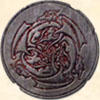Pazruki
The Pazruki are a nation of humans who primarily inhabit chiefly the northern Koryaz mountains of the Ama Basin. Native speakers of Pazruk are also found in the forest to the east and the forested hills to the north of the Koryaz, but those Pazruki have lifestyles more similar to those of the Wu-haltai and Issacortae, respectively.
The clans of those regions often intermarry, and customs and beliefs tend to be similarly blended. In appearance, the Pazruki are small and slender. Their black hair is naturally straight, but traditionally both men and women shave it from adolescence on. Women then wear wigs of woven, dyed human and horse hair Men wear similar artificial beards (but not moustaches). I do not know the origin of this custom, but it may be the result of the accursed lice that breed in their homes.
The Pazruki are a pastoral people, primarily herding horses and sheep. Horses are utilized for their meat, milk and hides, as well as for riding and as the basic medium of wealth and exchange (other goods’ values are expressed in terms of horses). Sheep are raised for their wool, milk and mutton. The last is the the staple food of the Pazruki. Other animals raised include cattle, yaks and goats. Some fowl are kept, but not necessarily for food or eggs: the crowing cock is believed to ward off evil spirits.
Though herders, the Pazruki are not nomadic. The valleys of the northern Koryaz are large and fertile, so the livestock rarely depletes the grass supply. They do not need to move seasonally, either, because little snow reaches the valleys in the winter, and the animals can usually dig through what there is. A small amount of agriculture is practiced, growing fodder to supplement the winter diets of prized horses.
Pazruk society is patriarchal; inheritance is passed from father to youngest son. (The reason for this is explained in a myth, wherein the hearth-goddess, Tabit, descended from the heavens and gave her blessing and the sacred gold neck-torc to Pazruk, the youngest son of the Father of All Tribes.) Polygamy is a common practice; also, it is customary, for the preservation of the clan, for a man to marry his stepmother or sister-in-law upon the death of his father or brother. The basic socio-political unit of the Pazruki is the clan, or extended family. Each clan has its own patriarch and territory. Clans, usually speaking the same dialect, form loose alliances (often sealed by marriages) for mutual benefit. A Pazruk tribe consists of a network of such alliances. In dire times (natural disaster, invasion, etc.), the patriarchs of a tribe will elect one of their number to become the Great Father. (This brings great honor to the patriarch and his clan.) Once danger has passed, this title loses any weight, but patriarchs often retain it as part of their name. Pazruk religion is animistic. There are no priests or shamans. Religious rites are conducted by the head of household or the patriarch, as appropriate to the particular ceremony.
Though the Pazruki have no priests, some do feel a calling to the discipline of magic. Such individuals, male or female, go alone into the wilderness (preferably after receiving their patriarchs blessing) and learn the ways of the wu jen. Some later return to their people, to serve as wise men and guardians.
The preferred weapons of the Pazruk barbarians are horsebow, axe, spear and sword. Proficiencies they are commonly skilled in include agriculture, animal handling, bowyer, carpentry, chanting, dancing, fishing, horsemanship, pottery, singing, survival, tanning, tracking, weapon smith, and weaving.
